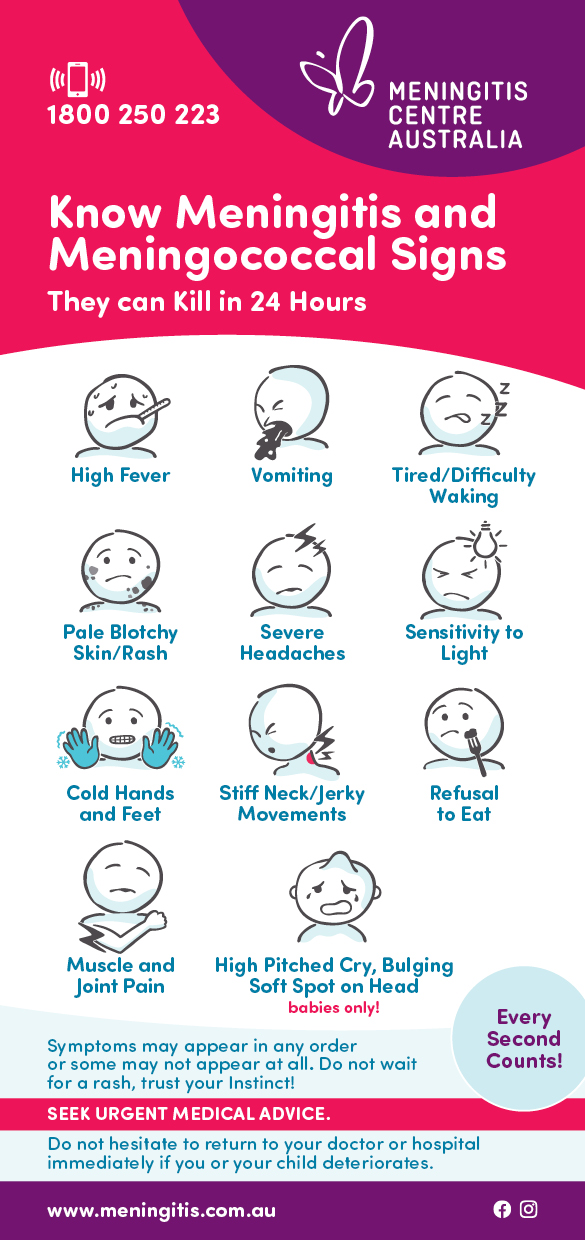Parents across the country are being urged to vaccinate their children from the deadly meningococcal disease after a six-month-old baby died in New South Wales.
It was the fourth case in the area this year and the 97th nationwide, but despite the disease taking lives every year, Australians aren’t immunised for free from the most deadly strain of the virus.
The pleas to vaccinate came as one of the nation’s leading infectious diseases experts, Professor Robert Booy, said thousands of Australians are dying from diseases like meningococcal disease while the Pharmaceutical Benefits Advisory Committee (PBAC) decides which vaccines should be added to the list.
“There could be as many as 4000 flu deaths this year, including a dozen children, while meningococcal kills 10 per cent of sufferers and the B strain is at least half of that total burden,” Professor Booy said.
“If you lose your legs to meningococcal, you’re not going to get them back. Your costs don’t come down over time.”
Last year, there were 281 cases of meningococcal disease in Australia. The deadly B strain was a factor in 119 cases, the W strain in 100, and the Y strain in 45.
Despite the B strain being the most fatal, South Australia is the only state where it is provided free of charge.
In NSW the three shots can cost up to $500.
The meningococcal B vaccine has been put before the PBAC three times, and each time it has been rejected.
It was the B strain that Juttima Chinnasri picked up in October.
The 29-year-old felt feverish while working a shift at Star Casino in Sydney.
After she threw up, her supervisor sent her home. Thinking she just had the flu, Ms Chinnasri took some paracetamol and went to bed.
“The next morning I got up with diarrhea and vomiting. By about 8am I had purple rashes, purple spots. My sister rang an ambulance. They didn’t come and get me.”
She was told to see a GP within 16 hours. But knowing something was seriously wrong, Ms Chinnasri’s parents took her to St George Hospital immediately.
“I felt so weak I couldn’t walk. I kept going to the bathroom to throw up … my skin was so sensitive when people touched it.”
Ms Chinnasri was on life support for a week. Then after she came out of her coma, doctors told her they would need to amputate her legs.
She had studied a Bachelor of Medical Science and said although she knew about meningitis, was “one of those people who thought it would never be me”.
“When I saw the purple rash I didn’t think it would be that bad. Then when I saw my feet and fingers were black, I knew it was coming. I was still hoping they could fix it or my body could fight it.”
Although free immunisations are offered for ACWY strains, many people still aren’t vaccinated.
Sarah Joyce had been vaccinated with the C strain, but not the others.
Just after her 30th birthday, the funding co-ordinator was taken to hospital with extreme flu symptoms.
In 12 hours most of her body had completely shut down.
“Within hours my body began shutting down and it wasn’t until then that the typical ‘purple’ rash started on my legs,” she said.
“By then it was almost too late. This is when they realised this could be Meningococcal Disease. I was placed in an induced coma and was on life support fighting for my life.”
Ms Joyce had her spleen, gallbladder, large bowel and kidneys removed. She had three fingers and five toes amputated.
“I have a stoma bag, a feeding tube in my stomach and another port in my chest for intravenous feeds due to intestinal failure. I have had 33 surgeries since becoming sick.
“I am dependent on dialysis three days a week for 15 hours to keep me alive until I can be well enough to have a kidney transplant.
“I am unable to work. Some days I just can’t get out of bed and others I can. I live day by day. I consider myself lucky I am still here – despite what I have endured. Not everyone survives.”
Both Ms Joyce and Ms Chinnasri are rebuilding their lives, but others have not been so lucky.
Meningitis Centre Australia executive director Lisa D’Cruz said patients need to ask their doctors to check for meningitis if they’re experiencing flu-like symptoms.
“You can wake up in the morning quite fine and you could be dead by the end of the day,” Ms D’Cruz said.
“We know patients can go back and forth to a doctor a few times before they’re diagnosed.
“We urge patients if they are feeling unwell to ask if it could be meningitis or meningococcal.”
She said at the end of the day, the only way to stop the disease spreading was to make sure you were vaccinated against all strains.
“There are five common strains. The good news is they’re all vaccine-preventable.”
SOURCE: The New Daily

